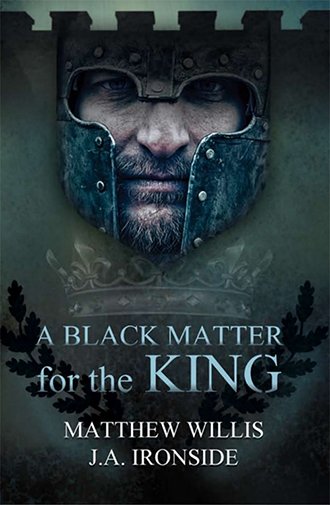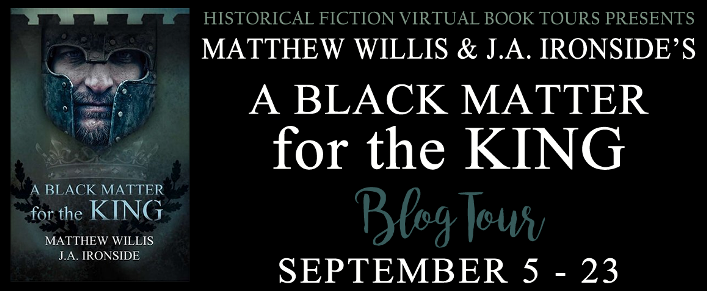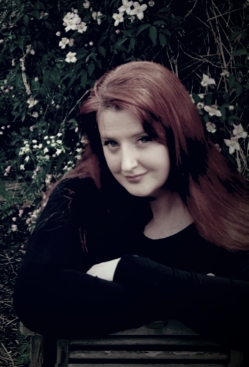I hope you enjoy the interview and please don't forget to enter the giveaway!
Hello Matthew & J.A. (Jules) and welcome to Passages to the Past! Thanks so much for stopping by today to talk about A Black Matter for the King!
To begin, can you please tell us a little about yourself and your novel?
Jules: Ordinarily I write sci-fi and fantasy, and even when I dip into history for inspiration or setting, I’m usually coming at it from a fantastical angle. So it was an interesting change to write something that was devoid of any fantasy or supernatural elements. A Black Matter for the King tackles one of those pivot points in history that most probably changed its course – the Battle of Hastings. In addition, it explores the events directly leading up to the battle and the aftermath. Whereas the previous book, An Argument of Blood, explores the political wranglings and machinations from around 1045 onwards. The interesting thing with the Battle of Hastings is that it was really only the culmination of decades of simmering conflict between two very different nations and cultures, with at least two versions of the Medieval Christian Church throwing an arm in too. In scope, the whole situation was far broader than one decisive battle. Although the very nature of the battle deciding the fate of these two nations has naturally leant itself to a lot of romanticism and perhaps some oversimplification. What Matt and I have done with the Oath and Crown Duology, is to give a much bigger picture of the overall situation, whilst exploring the religious and cultural clash between the Saxons and the Normans.
Matt: I’m a bit of a polyglot, writing-wise. I write historical and speculative fiction, and historical non-fiction tending towards the technical – books about historic military aircraft and so on. Jules has covered A Black Matter for the King really succinctly so I don’t feel I need to add anything there, fortunately.
How did the idea come up between you two to co-write the Oath and Crown duology?
Jules: I think Matt’s exact words were ‘does anyone fancy writing a Battle of Hastings book with me?’ I thought it sounded like fun. I was right.
Matt: That’s about the size of it. I heard that Penmore Press was looking for a book about William the Conqueror, which was out of my usual line (I tend to write much more recent history) but sounded intriguing and I wanted to give it a go. As it was a new project I thought I’d ask around and see if anyone wanted to co-write it. Foolishly, I thought it would be much easier to write half a novel each! As it turned out, we each wrote half of a duology.
What type of research did you do for writing A Black Matter for the King?
Jules: I read the Anglo-Saxon Chronicle and various books on Saxon Britain. I also read a lot of Anglo-Saxon poetry and whatever I could get hold of in terms of Anglo-Saxon mythology. Nordic mythology too – the Saxons weren’t so very far removed from the Nords and the Danes in 11th C Britain – and I dipped into Welsh history and mythology too, since there was unease between the ‘Wealas’ and the Saxons. While the myths and poetry weren’t directly useful because it mostly wasn’t quite the correct time period, I think it really helped create an authentic seeming Saxon mindset. It’s hard with historical fiction to walk the line between creating characters a modern audience can identify with and creating characters that are authentically of their time. We don’t know for sure how the Saxons thought but a good way to get under the skin, or so I found, was to look at their art and stories and what they believed. The Bayeux Tapestry was invaluable in this sense.
Matt: I approached it in much the same way as Jules, but with more focus on the Norman side, as that was how we divided up the research and initial drafting. This included biographies of William, studies of the culture and warfare of the time, and some of the contemporary literature. The Song of Roland, for example, was a Frankish epic poem written at around the time William lived, and which seemed to have a great influence on the early Anglo-Normans. Things like this helped me get inside the heads of the Normans. While approaching them with a measure of scepticism, I found the first generation of accounts of William’s life and battles, from both Norman and Saxon chroniclers like Wace and Orderic Vitalis, to be especially useful. Ultimately I approached the research as a means of establishing the what, where and when, and left it to imagination to provide the why and how.
Did you find anything in your research that was particularly fascinating or that helped shaped the novel?
Jules: I could have disappeared down a research rabbit hole very easily. I didn’t know more than the broad strokes of the historical events and the whole process of research was fascinating, if a slightly intense course in 11th C British history. Where the historical narrative became especially interesting, or at least odd, was where Saxon and Norman historical figures crossed paths. Several times we thought we had created a fictional situation only to discover from some obscure source that our fictional event had really happened.
Matt: Same. Some of the most useful material I found related to the culture and lifestyle of the period. A paper on deer hunting in the literature of the late mediaeval period really sparked my imagination, and led to the opening scene of An Argument of Blood. A 19th century account of the assassination attempt against William when he was 19 or 20 really sparked my imagination as well, although it’s probably a bit suspect historically, so it took a lot more research to nail the details
How did you handle the process of co-writing? Did you each have specific scenes you wanted to tackle? Did you physically get together to write?
Jules: Matt and I are part of the same writing group so we were used to working together on projects. That said this was our first attempt at co-writing. We more or less decided to handle one side of the narrative each, working to a rough historical timeline, and from there we exchanged chapters. In some ways it was like having a built critique partner on the project and worked really well for us.
Matt: It certainly did. For my part, having Jules working on the same book kept me honest and on track, not to mention providing a whole lot of inspiration. Seeing the richness and sophistication of Jules’ chapters really spurred me to look at different angles and depths in my own. Where characters from the different ‘worlds’ met, we brainstormed dialogue and then wrote the scenes around it. Two heads really are better than one for that kind of thing.
What was your favorite scene to write?
Jules: There are several but I think if I had to pick one it would have to be the Battle of Stamford Bridge. While I was writing it from a non-warrior’s perspective, it was still a lot of fun to write. Plus it was an incredibly bloody battle – the Norwegian forces had assembled a fleet of 300 ships, including supply ships, and when the battle was over, only 24 ships were needed to carry the survivors home.
Matt: I actually really enjoyed writing the opening scene of An Argument of Blood where the youthful William takes part in a stag hunt. It felt as though it was the last time in his life that he was truly carefree, and I loved the energy of that. The other scene that stands out for me was the cavalry battle in front of Mont Saint Michel in A Black Matter for the King, where William and Harold fight together, and the aftermath of that. It was the blooming of their brief ‘bromance’ and really fun to write.
What was the most difficult scene to write?
Jules: I think I’m in the rare position of being able to say I loved writing each and every scene I wrote. However, some of the interactions between Ælfgifa and her mother were a bit painful. I feel I’ve been a bit unfair to Gytha since we don’t really know what happened. There’s so little known about Harold’s youngest sister, Ælfgifa. She may have died in childhood or, as we have theorized in Oath and Crown, there may have been some other reason for keeping her out of the limelight. A difficult mother-daughter relationship was tricky to portray faithfully, but also in keeping with the mindset of the time. And the mindset of the time was that producing a child of inferior health or deformity cast aspersions on the mother. Some mothers were happy to be rid of such children. Imagining the resentment of the highborn Gytha when forced to keep and rear a child who essentially became a stain on her own reputation was both interesting and challenging.
Matt: As the name suggests, things got pretty dark for William at times. One thing that’s apparent from the history, whoever wrote it, was that he had an incredibly brutal streak. There was one incident that in the initial draft was left in the background, as it was seriously nasty. The more we looked at it, however, the more apparent it became that we needed to include it without shying away from the likely reality. As Jules says, life in the 11th century was hard and generally short. There was little room for sentimentality. I won’t say any more about this particular scene, but it’s not for the faint hearted.
When did you know you wanted to be a writer?
Jules: When I was nine, although it was more as though I discovered I already was one and hadn’t realised before. It should be noted that my first book, written at the same age, was devoid of character, plot, setting, style and pretty much anything that would have made it a book.
Matt: For as long as I can remember. I always loved writing stories and knew from a pretty early age that I would always write – and preferably that writing would be my life. My first attempt to write a novel was at the age of nine or ten. I didn’t get more than a few pages in before running out of steam, but kept trying.
What has been your greatest challenge as a writer? Have you been able to overcome it?
Jules: Talking about my writing. It took me nearly twenty years of writing in secret before I was ready to admit it. I’m better now but it’s still a work in progress. I wouldn’t say I did completely overcome it, I just found ways to work inspite of it. Deciding that not every word had to be struck gold or perfectly flawless and letting myself have fun with my writing really helped though.
Matt: Learning not to overthink myself into failure before I even start. Over the years I gathered masses of ideas, notes and research that never turned into much actual writing. Looking back, it was a form of procrastination, waiting for some mythical time when I would be ‘ready’. What saved me from that was NaNoWriMo, which forced me to dispense with the years of planning and research that I thought constituted the right way of writing a novel, and just launch myself in. I certainly haven’t overcome the overthinking, but I know that with a fair wind I can win temporary victories over it.
Who are your writing inspirations?
Jules: Far too many to name. Stephen King is a big influence but not as a paragon for success, for his way of making you want to turn the page and for creating engaging characters. Frank Herbert is another influencer. And many novelists of the 19th C.
Matt: Joseph Conrad and William Golding are the main ones – although they seem to have imparted more of their slow progress and agonising self-doubt than their prodigious writing talents. I love Stephen Baxter’s talent for making you root for a character and then progressively challenge your view of them.
What was the first historical novel you read?
Jules: If Sir Walter Scott’s Ivanhoe counts, then it was Ivanhoe when I was about 11, I think. If not, Sharpe’s Tiger by Bernard Cornwell at around the same age. A lot of historical setting I first encountered through 19th C classics though.
Matt: It was probably Lieutenant Hornblower by CS Forester, when I was about nine or ten. It would certainly been something with battles in it, and more than likely sea battles. I remember being particularly intrigued by that book, though, as it was written from the point of view of a secondary character, Lieutenant Bush.
What is the last historical novel you read?
Jules: The Essex Serpent by Sarah Perry, which is set in 1890s Essex near the salt marshes and deals with the emerging fascination for naturalism and fossil hunting, and just what kind of threat that posed to the English Church. Highly recommend it.
Matt: I think it was Peace, by Richard Bausch, which is a rather unusual novel set in the Italian campaign in 1944. It’s not a typical war story by any stretch of the imagination. It follows a small group of soldiers scouting ahead of a main advance, increasingly questioning the loyalties of their guide and the morality of their officers. It didn’t knock my socks off but has seeped into my psyche like a half-remembered unsettling dream.
What are three things people may not know about you?
Jules: I co-host a weekly literature podcast called Dissecting Dragons which looks at all aspects of speculative fiction. I’m a complete martial arts nerd, mostly karate. I like to collect dead or little used languages and odd words.
Matt: I wrote a biography of a little-known test pilot that was published last year, and a few days ago I got to fly in an aeroplane he’d piloted eighty years ago – a beautiful de Havilland Moth biplane. Is that two things? I run the website NavalAirHistory.com, which as the name suggests aims to cover all things about aircraft at sea. If you need one more – I’m trained in surveillance and interviewing suspects of crime.
What appeals to you most about your chosen genre?
Jules: All fiction allows you to ask questions and answer them through the process of writing. In the case of historical fiction, I love that you can metaphorically visit the past. Writing historical fiction is different from other types of fiction in that you have specific beats to hit because certain historical events happened. I love the fact that the process is a ‘why-dunnit’ instead of a ‘whodunnit’.
Matt: I’ve always had much more of an affinity with the past than the present. I like to be able to explore those times that I missed out on, for better or worse.
What historical time period do you gravitate towards the most with your personal reading?
Jules: I don’t have a specific favourite. I’m endlessly curious about the past and will be drawn to a good book regardless of the setting. I seem to have read a lot set during the Black Death recently though.
Matt: The two eras that I’ve generally gravitated towards are the Napoleonic Wars and the first half of the 20th century, but I’ve recently developed a passion for mediaeval fiction. I wish I’d discovered Michael Jecks’ series’ before now. I read Fields of Glory, was blown away and in a moment of total fanboy overenthusiasm approached Michael and asked him to read our Oath and Crown books. He was incredibly kind, read both books and wrote a fantastic review of them. It really gave me a boost of confidence that we were doing it well.
What do you like to do when you aren't writing?
Jules: In the tiny slice of time between working and writing? Read. Take long walks. Karate.
Matt: Fell walking. I’m trying to climb all 214 Wainwright peaks in the English Lake District. I’ve done about 30 so far.
Lastly, will you have more projects together in the future?
Jules: I’ve been hinting... ;)
Matt: Haha, yeah. Something will happen. I’m a slow writer and have several projects underway, but we’ll definitely come back to this.

A Black Matter for the King by Matthew Willis & J.A. Ironside
Publication Date: September 7, 2018
Penmore Press LLC
Paperback & eBook; 302 Pages
Series: Oath and Crown #2
Genre: Historical Fiction/War
TWO POWERFUL RIVALS -- ONE DECISIVE BATTLE
Now a political hostage in Falaise, Ælfgifa forms an unlikely friendship with William, Duke of Normandy. William has been swift to recognize her skills and exploit them to his advantage. However, unbeknownst to the duke, Gifa is acting as a spy for her brother, Harold Godwinson, a possible rival for the English throne currently in the failing grip of Edward the Confessor. Homesick and alienated by the Norman court, Gifa is torn between the Duke's trust and the duty she owes her family.
William has subdued his dissenting nobles, and a united Normandy is within his grasp. But the tides of power and influence are rarely still. As William’s stature grows, the circle of those he can trust shrinks. Beyond the English Channel, William has received news of Edward's astonishing decree regarding the succession. Ælfgifa returns to an England where an undercurrent of discontent bubbles beneath the surface. An England that may soon erupt in conflict as one king dies and another is chosen.
The ambitions of two powerful men will decide the fates of rival cultures in a single battle at Hastings that will change England, Europe, and the world in this compelling conclusion to the Oath & Crown series on the life and battles of William the Conqueror.
"There is little which is quite so exciting for me as discovering afresh, new talent in historical writing. In Willis and Ironside I feel I've found two writers who can carry me back to the past and can show me a time when, amid the brutality and irrationality of politics, there were still great characters, men of vision and daring, and women of intelligence and foresight. In fact these stories are a lot more than a short war series. They are a rich, extraordinarily well-researched, and meticulously told history of love, jealousy, honour, betrayal, deceit and death. It gives one version - convincingly told - of the curious oath sworn by Harold to William, but it is also the story of different nations, different cultures, and the clash when two warlords desire the same thing. In case I hadn't made it obvious, I loved these books. Sweeping history, battles galore, treachery, a cast of glorious, well-depicted characters - all in all, a fabulous story told brilliantly." - Author Michael Jecks
Amazon | Barnes and Noble | Chapters
About the Authors
J.A. Ironside (Jules) grew up in rural Dorset, surrounded by books - which pretty much set he up for life as a complete bibliophile. She loves speculative fiction of all stripes, especially fantasy and science fiction, although when it comes to the written word, she's not choosy and will read almost anything. Actually it would be fair to say she starts to go a bit peculiar if she doesn’t get through at least three books a week. She writes across various genres, both adult and YA fiction, and it’s a rare story if there isn’t a fantastical or speculative element in there somewhere.Jules has had several short stories published in magazines and anthologies, as well as recorded for literature podcasts. Books 1 and 2 of her popular Unveiled series are currently available with the 3rd and 4th books due for release Autumn/ Winter 2017.
She also co-authored the sweeping epic historical Oath and Crown Duology with Matthew Willis, released June 2017 from Penmore Press.
Jules now lives on the edge of the Cotswold way with her boyfriend creature and a small black and white cat, both of whom share a god-complex.
Website | Facebook | Twitter | Goodreads
Matthew Willis is an author of historical fiction, SF, fantasy and non-fiction. In June 2017 An Argument of Blood, the first of two historical novels about the Norman Conquest co-written with J.A. Ironside, was published. In 2015 his story Energy was shortlisted for the Bridport short story award.Matthew studied Literature and History of Science at the University of Kent, where he wrote an MA thesis on Joseph Conrad and sailed for the University in national competitions. He subsequently worked as a journalist for Autosport and F1 Racing magazines, before switching to a career with the National Health Service.
His first non-fiction book, a history of the Blackburn Skua WW2 naval dive bomber, was published in 2007. He now has four non fiction books published with a fifth, a biography of test pilot Duncan Menzies, due later in 2017. He currently lives in Southampton and writes both fiction and non-fiction for a living.
Website | Facebook | Twitter | Goodreads
Blog Tour Schedule
Wednesday, September 5Excerpt at Passages to the Past
Friday, September 7
Feature at The Writing Desk
Monday, September 10
Review at Pursuing Stacie
Friday, September 14
Interview at Passages to the Past
Thursday, September 20
Review at Hoover Book Reviews
Friday, September 21
Review at Locks, Hooks and Books
Saturday, September 22
Review at Svetlana's Reads and Views
Sunday, September 23
Review at Bookramblings
Review at Donna's Book Blog
Giveaway
During the Blog Tour we will be giving away a signed copy of A Black Matter for the King to one lucky reader! To enter, please enter via the Gleam form below.Giveaway Rules
– Giveaway ends at 11:59pm EST on September 23rd. You must be 18 or older to enter.
– Giveaway is open INTERNATIONALLY.
– Only one entry per household.
– All giveaway entrants agree to be honest and not cheat the systems; any suspect of fraud is decided upon by blog/site owner and the sponsor, and entrants may be disqualified at our discretion.
– Winner has 48 hours to claim prize or new winner is chosen.
A Black Matter for the King



















No comments:
Post a Comment